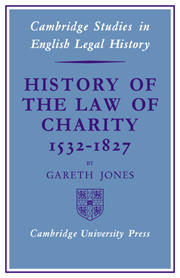Book contents
- Frontmatter
- Contents
- Preface
- List of Abbreviations
- Table Of Statutes
- Table Of Cases
- THE DEVELOPMENT OF THE LAW OF CHARITY 1532–1700
- THE DEVELOPMENT OF THE LAW OF CHARITY 1700–1827
- Appendixes
- Appendix A Bills and Answers in Chancery relating to Charity, 1350–1601
- Appendix B Selected Transcriptions
- Appendix C The Charitable Uses Act, 1597: 39 Elizabeth I c. 6
- Appendix D The Charitable Uses Act, 1601: 43 Elizabeth I c. 4
- Appendix E A Bibliographical note on the Cambridge MS. of Francis Moore's Reading on the Statute of Charitable Uses: 43 Elizabeth I c. 4
- Appendix F Francis Moore's Notes and his Speech at the Beginninge
- Appendix G A Case from Francis Moore's Reading
- Appendix H Inquisitions before the Charity Commissioners: 1597–1787
- Appendix I Decrees made by the Charity Commissioners: 1597–1787
- Appendix J The Mortmain Act, 1736: 9 George II c. 36
- Appendix K The Poor Relation Cases
- Index
Appendix E - A Bibliographical note on the Cambridge MS. of Francis Moore's Reading on the Statute of Charitable Uses: 43 Elizabeth I c. 4
Published online by Cambridge University Press: 07 October 2011
- Frontmatter
- Contents
- Preface
- List of Abbreviations
- Table Of Statutes
- Table Of Cases
- THE DEVELOPMENT OF THE LAW OF CHARITY 1532–1700
- THE DEVELOPMENT OF THE LAW OF CHARITY 1700–1827
- Appendixes
- Appendix A Bills and Answers in Chancery relating to Charity, 1350–1601
- Appendix B Selected Transcriptions
- Appendix C The Charitable Uses Act, 1597: 39 Elizabeth I c. 6
- Appendix D The Charitable Uses Act, 1601: 43 Elizabeth I c. 4
- Appendix E A Bibliographical note on the Cambridge MS. of Francis Moore's Reading on the Statute of Charitable Uses: 43 Elizabeth I c. 4
- Appendix F Francis Moore's Notes and his Speech at the Beginninge
- Appendix G A Case from Francis Moore's Reading
- Appendix H Inquisitions before the Charity Commissioners: 1597–1787
- Appendix I Decrees made by the Charity Commissioners: 1597–1787
- Appendix J The Mortmain Act, 1736: 9 George II c. 36
- Appendix K The Poor Relation Cases
- Index
Summary
The reading was an integral part of the education of the medieval law student, and a necessary exercise for the utter barrister who cast covetous eyes to the Bench of his Inn, the Order of the Coif and a judgeship in the Common Pleas or King's Bench. At one time each reader discoursed on one of the ‘old’ statutes before Edward III (especially Magna Carta, Merton, Marlborough, Westminster I, Gloucester and Westminster II), but during the sixteenth century readers acquired a wider range of choice; so Coke and Bacon were to read on the Statute of Uses, 1535 and Moore on the Statute of Charitable Uses, 1601. The ‘antient readings’ are said to have served the apprentices well, particularly as an introduction to the dark intricacies of medieval land law. Coke esteemed them as having five excellent qualities:
First, they declared what the common law was before the making of the statute, as here it appeareth. Secondly, they opened the true sense and meaning of the statute. Thirdly, their cases were briefe, having at the most one poynt of the common law and another upon the statute. Fourthly, plaine and perspicuous, for then the honour of the reader was to excell others in authorities, arguments, and reasons for proofe of his opinion, and for confutation of the objections against it. […]
- Type
- Chapter
- Information
- History of the Law of Charity, 1532-1827 , pp. 229 - 239Publisher: Cambridge University PressPrint publication year: 1969



